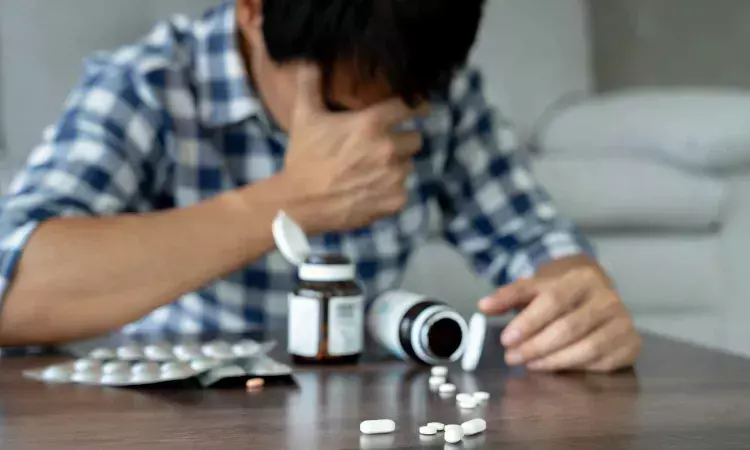- Home
- Medical news & Guidelines
- Anesthesiology
- Cardiology and CTVS
- Critical Care
- Dentistry
- Dermatology
- Diabetes and Endocrinology
- ENT
- Gastroenterology
- Medicine
- Nephrology
- Neurology
- Obstretics-Gynaecology
- Oncology
- Ophthalmology
- Orthopaedics
- Pediatrics-Neonatology
- Psychiatry
- Pulmonology
- Radiology
- Surgery
- Urology
- Laboratory Medicine
- Diet
- Nursing
- Paramedical
- Physiotherapy
- Health news
- Fact Check
- Bone Health Fact Check
- Brain Health Fact Check
- Cancer Related Fact Check
- Child Care Fact Check
- Dental and oral health fact check
- Diabetes and metabolic health fact check
- Diet and Nutrition Fact Check
- Eye and ENT Care Fact Check
- Fitness fact check
- Gut health fact check
- Heart health fact check
- Kidney health fact check
- Medical education fact check
- Men's health fact check
- Respiratory fact check
- Skin and hair care fact check
- Vaccine and Immunization fact check
- Women's health fact check
- AYUSH
- State News
- Andaman and Nicobar Islands
- Andhra Pradesh
- Arunachal Pradesh
- Assam
- Bihar
- Chandigarh
- Chattisgarh
- Dadra and Nagar Haveli
- Daman and Diu
- Delhi
- Goa
- Gujarat
- Haryana
- Himachal Pradesh
- Jammu & Kashmir
- Jharkhand
- Karnataka
- Kerala
- Ladakh
- Lakshadweep
- Madhya Pradesh
- Maharashtra
- Manipur
- Meghalaya
- Mizoram
- Nagaland
- Odisha
- Puducherry
- Punjab
- Rajasthan
- Sikkim
- Tamil Nadu
- Telangana
- Tripura
- Uttar Pradesh
- Uttrakhand
- West Bengal
- Medical Education
- Industry
JAMA Study finds No link between GLP-1 analogues and suicide

There has been concern that common diabetes drugs could increase the risk of suicide and self-harm. In a new study, led by researchers at Karolinska Institutet and published in Jama Internal Medicine, no such risk increase was observed.
Drugs of the type GLP-1 analogues lower blood sugar levels and are used by millions of people worldwide. They are mainly used to treat diabetes, but drugs such as Ozempic have also been shown to be effective against obesity, which has increased their popularity.
At the same time, both American and European drug authorities have warned that there may be risks associated with the drugs.
Last year, the European Medicines Agency (EMA) launched an investigation following around 150 reported possible cases of suicidal thoughts and self-injury with use of GLP-1 analogues.
The investigation was completed in the spring and based on the limited data available at the time, it concluded that there were no obvious connections. Researchers at Karolinska Institutet can now further support this conclusion. They have analyzed large amounts of data from people treated with GLP-1 analogues in Sweden and Denmark .
"We found no clear link between the use of the drugs and an increased risk of suicide death, self-harm or depression and anxiety-related disorders. This is reassuring." says Björn Pasternak, principal researcher at the Department of Medicine, Solna, Karolinska Institutet, and one of the study's lead authors.
The data includes approximately 300,000 adults aged 18–84 who started treatment with either GLP-1 analogues or SGLT2 inhibitors, another type of diabetes medication, during the years 2013–2021.
After a mean follow-up period of just over two years, there was no apparent increase in the proportion of people who committed suicide, engaged in self-harm, or suffered from depression or anxiety-related disorders among users of GLP-1 receptor agonists.
Peter Ueda, assistant professor at the same department and one of the study's main authors, nevertheless emphasizes the importance of larger studies as more data is collected.
"It is important to specifically examine people with previous self-harm or suicidal thoughts as they are at increased risk and it is possible that the drug’s safety profile differs in this group," he says.
Reference:
Ueda P, Söderling J, Wintzell V, et al. GLP-1 Receptor Agonist Use and Risk of Suicide Death. JAMA Intern Med. Published online September 03, 2024. doi:10.1001/jamainternmed.2024.4369
Dr Kamal Kant Kohli-MBBS, DTCD- a chest specialist with more than 30 years of practice and a flair for writing clinical articles, Dr Kamal Kant Kohli joined Medical Dialogues as a Chief Editor of Medical News. Besides writing articles, as an editor, he proofreads and verifies all the medical content published on Medical Dialogues including those coming from journals, studies,medical conferences,guidelines etc. Email: drkohli@medicaldialogues.in. Contact no. 011-43720751


